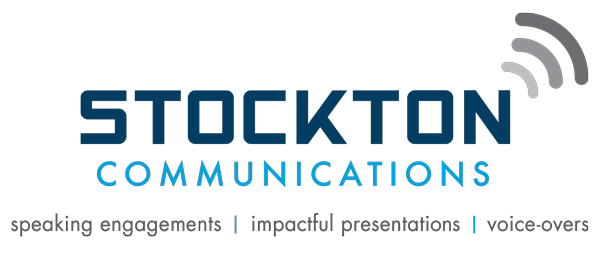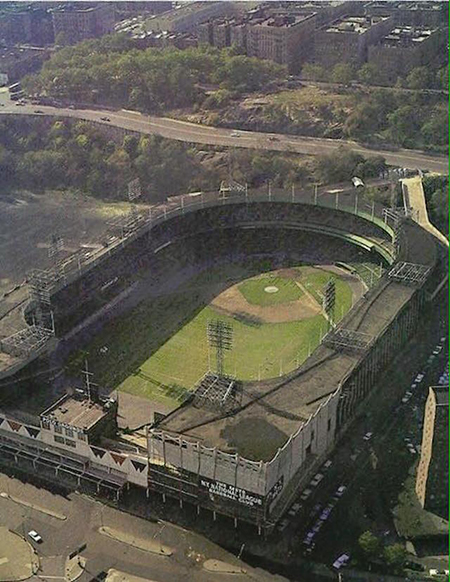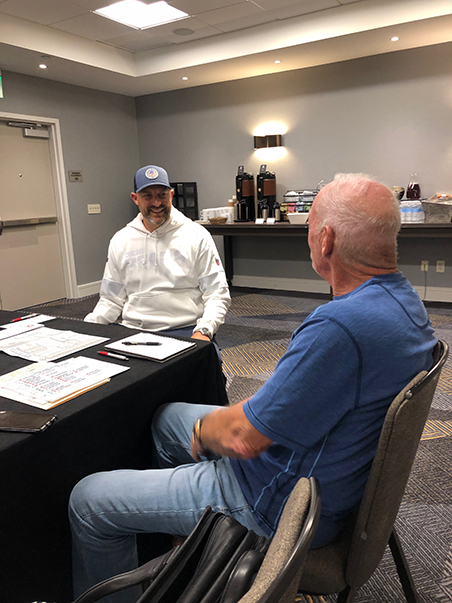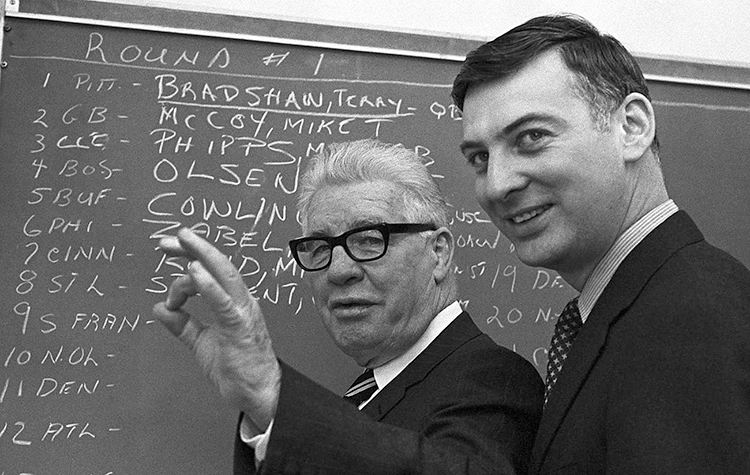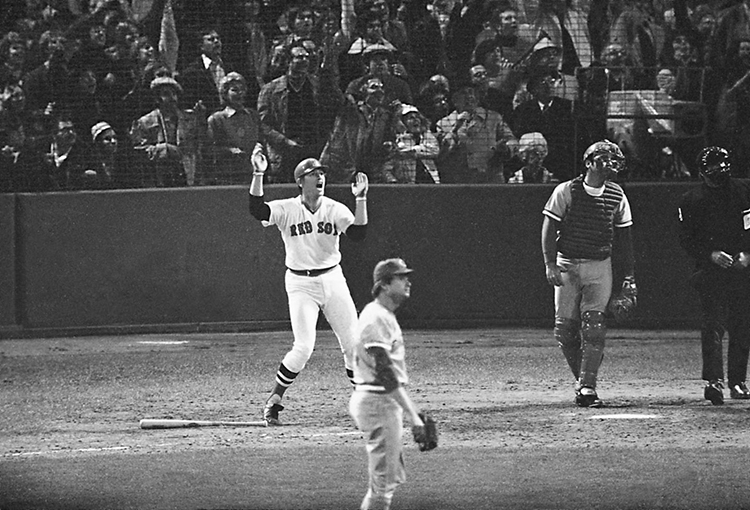My Interview with Ithaca College Freshman Matthew Kane

Throughout my career, I’ve been asked to give advice to young aspiring hopefuls who are looking to the world of communication for their future.
Many are have not yet narrowed down their focus on what particular field appeals to them, except for the fact they want it to be in the sports world.
It may be in the production of live sports events, or in the studio, which is becoming more and more popular, or it could be in the field of public relations, sports management, or many other fields. The horizon is limitless.
Most of the requests I receive, and unfortunately they are too numerous to address each one, deal in sports broadcasting. It’s what I do.
So, in an effort to get my views out to as broader audience, I offer the following:
A good friend of mine, Mike Phelps, from Wellesley Island in upstate New York, asked me if his nephew, Matthew Kane, could interview me for a school project.
Matthew is a freshman at Ithaca College in New York, and here is the transcript of that interview, and his personal observation at the end.
I hope it makes for interesting reading and helps others who want to make sports broadcasting their career as well.
Matt Kane
Matt Kane (MK): Based on my research, you graduated from Syracuse University with a degree in speech and dramatic arts, is that correct?
Dick Stockton (DS): Yeah, yes that’s what it was, I took a lot of different courses. They didn’t have any broadcasting degrees then and so it was basically speech and dramatic art but a lot of political science too.
MK: So, what made you want to get into the Sports Media field?
DS: Well I wanted to be a sportswriter initially, I lived in the suburbs of New York City, Queens, and my dad used to bring home 8 newspapers a day. I can name the papers it was: The Times, The Harold Tribune, The Mirror, The Daily News, The New York Post, World-Telegram and Sun, The Journal American Long Island Press and I used to analyze how guys would write game stories and how columnists would write what they did. So, my interest strictly was wanting to write and become a sportswriter and I wrote for my high school paper at both high schools. Then I wrote for The Daily Orange when I was a freshman in Syracuse and I went to Syracuse because of journalism, they had an outstanding journalism program.
MK: Yeah. So, you’ve always like growing up had a love for sports?
DS: Yeah yeah that was because of my dad who’s in the printing business but he had tickets, season tickets, not for every game but at the polo grounds where the New York Giants played before they went to San Francisco and he would take me to some 20 games a year and take me to Madison Square Garden but really not just take me to a game and have a hot dog but to explain all these games and we used to watch the Giants and the Dodgers and the Yankees on television cause they televised all their home games at the time.
Polo Grounds
MK: Yeah. So, my next question is you worked at big television networks like CBS Sports and now you work at FOX Sports as well as a lot of radio channels. How important do you think developing relationships and networking is in the field?
DS: Well the word networking never applied; I never knew what networking was back there. Actually, you could define networking to me better than I could define it to you. But it was really, to be honest with you, when I was getting into the business no such thing.
MK: Okay, but now that you’re in the business do you feel that you’ve made a lot of relationships to which if you ever needed anything you could reach out to someone or something like that?
DS: Well at this point it wouldn’t make any difference because right now at this point I don’t need anything. But you know I think networking was a different story then cause there weren’t as many outlets, you know there were three networks and I didn’t ever intend to be with a network that wasn’t (phone breaks out) you know once I was interested in broadcasting, I wanted to pursue that and I would’ve been happy doing video sports and say in Denver, Colorado, my whole career that would’ve been fine. I never had a mind to become a network television guy or anything other than being a sport, you know do sports on the air somehow.
MK: Yeah.
DS: But as far as your question about networking, I mean at that time you were breaking in there was a thing called Broadcasting magazine and they would have ads in the back of the magazine and they would say, “WIBX in Utica: looking for morning guy to do news and far more announcements” and you would call them and they would say come in for an audition or do a tape and you’d get the job or not get the job. I never had networking affect anything that I’ve ever did. I had somebody who was the program manager of a TV station that liked what I did so I got onto television because I auditioned and got the job. But there was no such thing then of connections with people getting you into situations because there was just local stations or networks, that’s what it was.
MK: So that’s how you got your first job? I think I read your first job was a local radio station in Philadelphia.
DS: Yes, yes it was. I was working as a copy boy at WINS in New York, these stations were owned by group Westinghouse broadcasting in New York. They at the time they had a lot of radio and television stations and sister radio TV stations in the same market. And so, I started out with Westinghouse because they came to Syracuse to interview for possible management trainees to work at their stations. They wanted to train managers or sales people not on air people, that’s a union job so they weren’t interested in doing that basically, so I was selected at Syracuse to represent the eastern sector, they gave out eight of these so called internships and I spent the summer between my junior and senior year at KDK in Pittsburgh spending a week of ten weeks in different sections such as sales, such as news, such as program, things like that and that’s how with group W and when I got out of school, when I graduated from Syracuse and went into the Army, they said you have a job with us when you come out and it was to be a management trainee and then when I wanted to go on the air and say I wanted to audition for the Philadelphia radio station they said okay that’s not what we wanted to hire you for originally but go ahead and I auditioned and I got the job doing all night radio news in Philadelphia and that was my first job.
MK: So now going to you job now as a play-by-play announcer for the NFL games, what’s your typical Sunday like during the NFL season?
DS: Well it’s the weekend, it’s not just Sunday. It starts on Friday where we go to the city where the game is and we go to watch practices, talk to 4 or 5 people, you know the head coach, the coordinators, the quarterback and a couple of other players and just talk to them and then we have a production dinner at night, which is not about a meeting we just get together and we have a good time there. Then on Saturday we have a meeting room in our hotel which is open all day and I go in and I start to prepare what I need to prepare, which is less and less as I go on, on my boards and then at some point we all leave, the 4 of us, producer, director, my partner and our sideline reporter, we all leave go to the hotel of where the visiting team is and we meet with 4 of them and then we come back at around 6:30-7 o’clock on Saturday night and we have dinner in the room and we have our production meeting where we go over graphics, promos and just general talk of the game, not what we’re going to do that’s going to be what the game will determine what we do and how we do it. And then on Sunday morning, we get to the game about 2.5 hours before and that’s our schedule.
Matt Nagy at Fox Meeting
MK: Yeah, seems pretty cool. What advice would you give me moving on with my educational track only being a freshman here at Ithaca College in the field of Sports Media and any advice you’d have for me after graduation?
DS: Well number one, if there is an area of Sports Media that appeals to you, you may not have that yet, you’re a freshman you said?
MK: Yeah
DS: Yeah, I mean you may not know what you want to do. I knew when I was 9 years old that I wanted to be a sportswriter and only after I started with Syracuse and the other broadcasting thing came on that I knew I was going to be in that field. It wasn’t going to be as an agent, it wasn’t going to be as a public relations person, I mean I knew that and I didn’t know about those jobs, now people know about how Sports Media has branched out and so I would say that I would focus on what you want to do. I mean I would ask you; do you have any idea of what part of Sports Media you’re interested in?
MK: For me, I really like football so if it would be something you’re doing—
DS: What about football? Playing football?
MK: No like watching it and kind of analyzing it, I’d like to be on Good Morning Football like that, that’s one of my favorite shows to watch. But I can also see myself as play-by-play like you for the NFL too.
DS: Well I mean then you know as far as analyzing it you have to have a certain kind of expertise to do it. I mean there are a lot of these shows and so a lot of young people are enamored with these talk shows of sports during the week but you have to gain some expertise, now I have an opinion of these talk shows, which by the way make a lot of money for the networks that have them and that is that generally I decided I wanted to do play-by-play because I feel that those people who do these shows really don’t know about any of these teams, they don’t have any knowledge. They read stories and they take opinions and they don’t really know and the thing that I always wanted to do when I went into play-by-play which is a lot more difficult than doing studio shows is that you really have to know about a team, what makes them work strengths and weaknesses and you really know like if I were to ask a lot of the people who do these shows tell me what their offense philosophy is, what’s their identity, who’s their third string Tight End on the team and what role does he play, they would have no idea. Okay so that’s what takes so I kind of think those who work games are a lot more authentic, it’s just my opinion, well I know they are more authentic than people who do those talk shows although the talk shows are now the more glamourous aspect of it I think because when you do play-by-play you’re regionalized, not every game is a network game unless you’re the number one broadcast team.
MK: Yeah I understand that. So, what experience was CBS Sports looking for when they hired you? I know they hired you full-time in 1978 but I know you did a couple part-time things with CBS but overall when you got hired for that job what were they kind of looking for with your experience?
DS: It’s normally how you perform on the air and my beginning with CBS started 11 years before that. I actually started at CBS in 1967 and you talk about networking, but I was working at the local station in Pittsburgh of KDK and I was working the 6, 7 and 11 o’clock sports segments on the local news. That’s not as big anymore because of ESPN and all of those things where they have the complete sports so on the local news that was more prominent at that time, but I was working in Pittsburgh, I was 24 years old at the time and the Rooney family, the people who founded and still own the Pittsburgh Steelers football team had called somebody at CBS, the CBS president I guess, and said you got to take a look at this guy. I had no idea that they done that until later and they hired me to do postgame shows, there was no such thing as network postgame shows, they were done locally in the stadium of where the game was played so if there were 6 games on CBS on a given Sunday, there would be 6 postgame shows to those local markets down in the stadium and that’s where I got my start on a network doing that for a few years and then working my way into play-by-play because I had done well enough on those shows so they gave me a shot and I went from there so that’s what happened so I left CBS to go do the Boston Red Sox for 4 years and when I left the Red Sox I wanted to do network then and I came back in 1978 doing very little NFL or NBA broadcasts but being the host of the CBS Sports spectacular, which was there anthology show at CBS, which was there version of wide world of sports.
Art and Dan Rooney
MK: Okay, so when you started your career in 1965 at the local radio channel in Philadelphia, did you ever expect to be on FOX Sports 30 years later?
DS: No, I never thought of anything like that. You don’t think of that, you’re just saying I have a job and I’m doing my job and I’m doing the best job that I can. I never thought of anything, just like when I called Carlton Fisk’s homerun in the 1975 World Series, I didn’t think this is going to be one of the greatest moments in Sports television history. You don’t think of that, you just do the job, you just do the game and then you do the next game so when I was working at KYW doing all night radio I was not thinking of doing NFL football for FOX that didn’t enter my mind. I didn’t even know what FOX was, and they didn’t either.
Carlton Fisk’s Homerun
MK: So, is there anything you wish you did differently in your career?
DS: Do differently? No, I’ve been blessed, there’s nothing I wish I did differently in my career. I am so grateful for the career I have so I don’t second guess anything that I ever did and anyone that would, would be foolish to do so.
MK: So, I read you called 6 Super Bowls, I’m pretty sure for 2002-2008.
DS: Well they were on world feed.
MK: Yeah International
DS: Correct
MK: Yeah you also did NBA finals games including the Lakers-Celtics finals series.
DS: I did all of the Lakers-Celtics finals
MK: Yeah Uncle Mike has told me about that.
DS: Ha yeah I know Uncle Mike was rooting for the Celtics too
MK: Yeah and then you also just talked about the MLB World Series games including the Carlton Fisk homerun of Game 6 in the 1975 World Series, which I did watch that it was pretty amazing and it’s one of your most memorable moments too.
DS: Yeah I mean you don’t know at the time. Everyone always assumes that you’re going to say wow this is going to go down in history. But all it was, was a homerun in the. 12th inning to send the World Series to the 7th game and that goes for anything that you ever do, you never know down the line time takes care of it. Whatever transpires when the time goes on but at the time you never take a step back and think about what this means you just do it and you execute it and then time will take care of how indelible it is in sports broadcasting history.
MK: So, would you say that it was your most memorable game you’ve called?
DS: Yes, yeah I would. I would because it was rated so by TV guide and it was such a dramatic homerun with all of the gyrations by Fisk and what it meant in that game to win it and send it to a 7th game so it just had the story to carry it.
MK: Do you think there’s any other memorable moments you’ve had in your career that stick out to you?
DS: Yeah there are a few of them. Ok sure. I would say the Lakers-Celtics series, there wasn’t one particular moment but maybe Magic Johnson’s baby hook or something like that, but the volume of what that rivalry meant in that decade, having been courtside for Bird and Magic and all of that would be right at the top, right near the top of the list. Michael Jordan scoring 63 points against the Celtics in the Boston Garden where he just played 8 games that year because he was out with an injury. That was big, Dan Jansen’s gold medal in speedskating performance which a lot of people don’t follow Olympics but if they did that would be right up there, maybe number two on my list after Fisk and there’ve been so many of them that those are the leading ones.
MK: Do you have any further advice for me or anything else?
DS: Yeah I do have advice. You say you like football, here’s the deal everyone likes the sport, everyone likes it. But do you know it? And so, what I suggest that you do is to really get to know and know detail and be original in your thoughts, okay. Even if it’s not the same thoughts that everyone has, it’s not a knee jerk reaction. If I were to ask you about a team, think about it and research it, not to fill up with a bunch of words but just to know it. If you’re going to distinguish yourself as an analyst of football and if you’re interested in going on many of these talk shows, know what you’re talking about but really know it. But don’t just take the surface, if you want to do play-by-play, take a tape recorder and go do a game, go do a game, record it on your phone, I had a tape recorder so I did that but record it on your phone and do a broadcast, sit in the back of the stadium where there’s no one around and prepare for it as if you were going on the air and do it because it’s going to be experience. In the long run, it’ll be experience, well you’re going to say how am I going to get a job if I don’t have any. Someone has to give you a break because they see something in you whatever it is that warrants them giving you a chance. Whatever it may be, it could be the way you handle yourself; it could be your vocabulary, it could be just the way you speak, it has nothing to do with anything else. It could be in a conversation the knowledge of sport that you have by studying it. I was blessed with having a father that taught me when I was 8, 9, and 10 years old, things that people wouldn’t know until they were 30. So, I was very fortunate that way and I knew and I wasn’t arrogant with it but it helped me when the time came for various situations where I had to audition to get jobs so I would say work at it, practice it, practice it and get better. And that’s my best advice for you.
MK: Okay well thank you so much for doing this!
DS: My pleasure.
_______________________________________________________
Book Dick Stockton as a speaker for your next event or meeting!
Dick is a distinguished and honored sports commentator who brings more than five decades of award-winning, sports broadcasting experience to your audience.
Dick tells a novel and fascinating story that strikes a chord with anyone in the audience that might relate in their own career about how one has excelled in a particular field and the story of how he got to where he is at today. He highlights the early days, the ups and downs, the big moments, and humorous instances along the way. It’s a story of moments and people which would be recognizable to virtually everybody.
Light, entertaining and engaging. Enjoy a 45-minute presentation with an audience-engaging 15-minute Question & Answer session to follow. Something for everyone to enjoy and remember from one of the most familiar voices in sports broadcast history.
The perfect way to change the pace for a Breakfast, Lunch or Post-Lunch Speaking Engagement.
Visit https://dstockton.com/meeting-planner-info/
Master of Ceremonies and Voice-overs for corporate videos and commercials are also among services offered.
